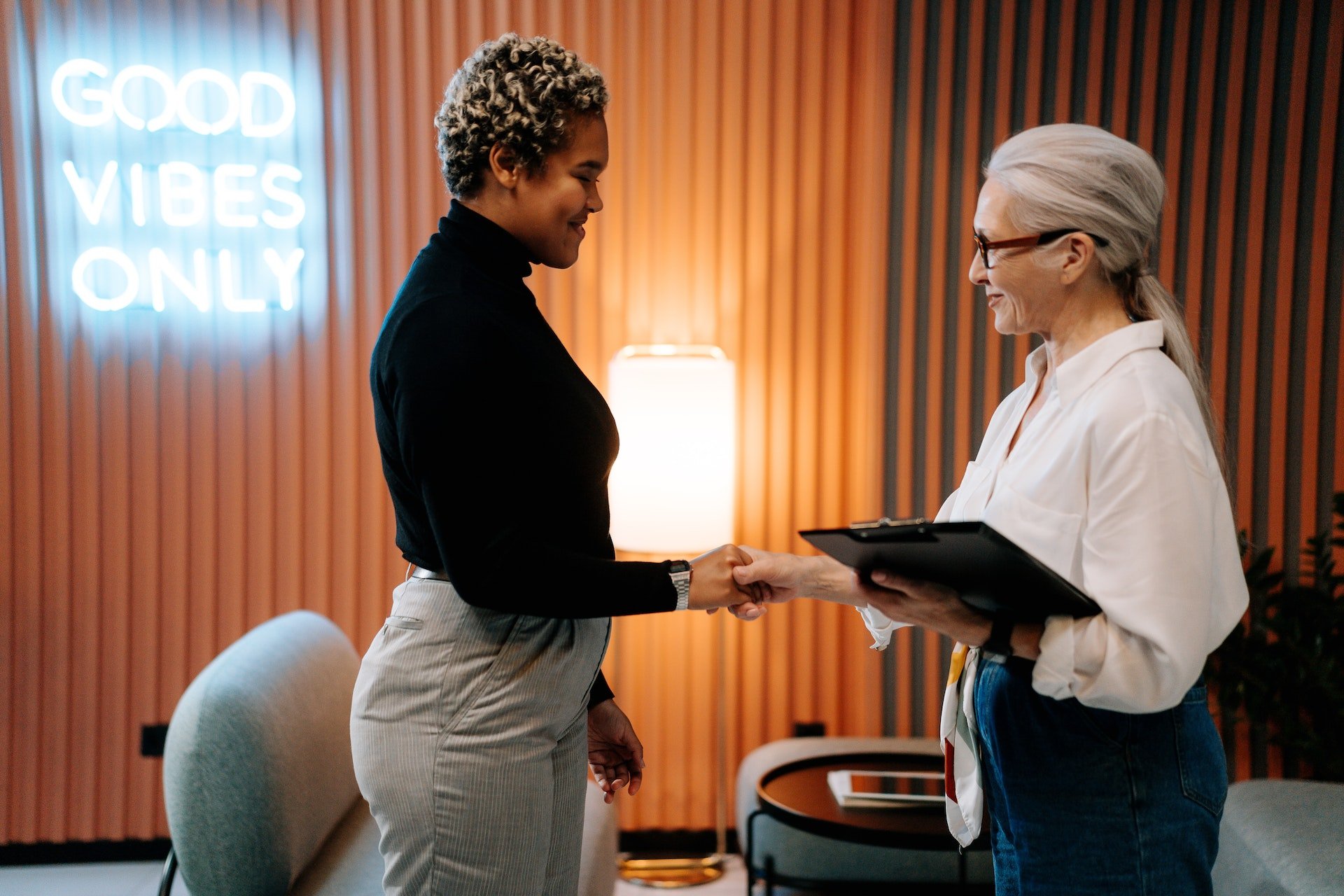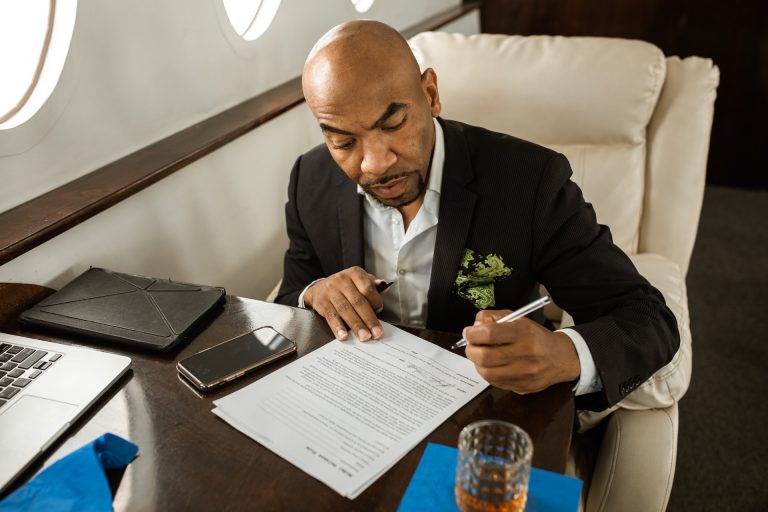Business English Excellence: Your Gateway to Global Success

English For Job Interviews: Key Phrases And Questions
Are you preparing for a job interview in English? If so, it’s crucial to familiarize yourself with key phrases and questions that will help you make a strong impression. In this article, we will provide you with essential information on how to navigate the interview process successfully.
Firstly, we’ll cover common interview questions that you should be prepared to answer. Knowing what to expect can greatly boost your confidence and ensure that you deliver articulate responses.
Next, we’ll introduce you to essential phrases for introducing yourself effectively. This includes how to convey your skills, experience, and personal qualities concisely and persuasively.
Additionally, we’ll discuss effective communication techniques that will help you express yourself clearly throughout the interview. This is vital for showcasing your professionalism and making a lasting impression on potential employers.
Moreover, we’ll emphasize the importance of researching the company beforehand. By demonstrating knowledge about their background, values, and goals, you will demonstrate your genuine interest in the position.
Finally, we’ll provide tips for answering behavioral questions – those that assess how you handle specific situations or challenges. These insights will enable you to respond confidently and demonstrate your suitability for the role.
By following these guidelines and mastering these key phrases and questions, you can increase your chances of success in any job interview conducted in English. So let’s dive in!
Table of Contents
Key Takeaways
- Job interview preparation: Familiarize yourself with key phrases and questions, and research the company’s history, culture, values, and recent accomplishments.
- Behavioral questions: Use the STAR method (Situation, Task, Action, Result) to structure answers and assess problem-solving abilities and how well you handle challenges.
- Introducing yourself effectively: Greet with a warm smile and maintain eye contact, summarize background, skills, and relevant experiences, and express genuine interest in the position and explain why you would be valuable.
- Effective communication techniques: Speak clearly and confidently, avoid filler words, and practice active listening.
Common Interview Questions
Are you ready to tackle some of the most common interview questions that can make or break your chances of getting hired? It’s important to be well-prepared for these questions as they often set the tone for the rest of the interview.
One common question is ‘Tell me about yourself.’ This is your chance to give a brief summary of your background, skills, and experiences relevant to the job you’re applying for.
Another question often asked is ‘Why do you want to work here?’ Here, you should demonstrate your knowledge and interest in the company, showing that you’ve done your research.
Finally, be prepared to answer behavioral questions like ‘Can you give an example of a time when you faced a difficult situation at work?’ These questions aim to assess your problem-solving abilities and how well you handle challenges.
Now let’s move on to essential phrases for introducing yourself without missing a beat.
Essential Phrases for Introducing Yourself
When introducing yourself in a job interview, it’s important to start off by greeting the interviewer with a friendly and professional demeanor.
Briefly summarize your background and experience, highlighting key achievements and skills that are relevant to the position.
Lastly, express your genuine interest in the position and explain why you believe you would be a valuable asset to the company.
Greeting the interviewer
Imagine walking into the interview room and confidently greeting the interviewer with a warm smile. Start off by saying, “Good morning/afternoon, it’s nice to meet you.”
This simple greeting sets a positive tone for the rest of the interview. Remember to maintain eye contact and offer a firm handshake as you introduce yourself. By doing so, you show your professionalism and confidence right from the start.
Transitioning into the next section where you briefly summarize your background and experience, you can say something like, “I’m excited to have this opportunity to discuss my qualifications for this position.”
This will demonstrate your enthusiasm and readiness to showcase your skills and expertise.
Briefly summarizing your background and experience
Upon entering the interview room, confidently greet the interviewer with a warm smile and express your excitement to discuss your qualifications for the position. To grab the attention of the audience, consider mentioning these key points about your background and experience:
- Highlight relevant work experience that demonstrates your skills and abilities.
- Mention any academic achievements or certifications that are relevant to the position.
- Discuss any specialized training or workshops you’ve attended.
Emphasize your ability to work well in a team environment by giving concrete examples. Mention any unique qualities or experiences that set you apart from other candidates.
By briefly summarizing your background and experience in this way, you’ll show the interviewer that you’re prepared and confident. In addition, it’ll help them understand why you’re a strong candidate for the position.
Moving on to expressing your interest in the position…
Expressing your interest in the position
I’m really excited about the opportunity to discuss my qualifications for this position and why I’m interested in it.
I believe that my skills and experiences make me a strong candidate for this role. In my previous job, I gained valuable experience in project management and successfully led a team to deliver exceptional results. This position aligns perfectly with my career goals, as it offers the chance to utilize my expertise in a dynamic and challenging environment.
Additionally, I am drawn to this position because of the company’s reputation for innovation and commitment to excellence. Your organization’s values closely align with mine, and I’m eager to contribute to its continued success. I’m confident that with my skills and dedication, I would be an asset to your team.
Moving forward into the section on effective communication techniques, it’s crucial for applicants like myself to showcase their ability to clearly articulate ideas and actively listen during interviews.
Effective Communication Techniques
When it comes to job interviews, using effective communication techniques can make a huge difference in how you’re perceived by the interviewer. It’s important to speak clearly and confidently, making sure to articulate your thoughts and ideas. Avoid using filler words such as ‘um’ or ‘like,’ as they can detract from your message.
Additionally, active listening is key during an interview. Show genuine interest in what the interviewer’s saying by nodding and maintaining eye contact. Don’t be afraid to ask for clarification if needed.
By practicing these effective communication techniques, you’ll be able to convey your qualifications and skills more effectively during the interview process.
Moving on to researching the company, it’s essential to gather information about their mission, values, and recent achievements so you can showcase your knowledge during the interview.
Researching the Company
To truly impress the interviewer and stand out from other candidates, you need to dive deep into researching the company’s history, culture, and recent accomplishments. By demonstrating your knowledge about the company, you show that you are genuinely interested in working for them. Take the time to explore their website, read their annual reports, and follow them on social media. This will give you valuable insights into their values, goals, and current projects. Additionally, make sure to research any recent news or press releases related to the company. This will help you understand their position in the industry and potential challenges they may be facing. Being well-informed about the company will enable you to ask intelligent questions during the interview and showcase your enthusiasm for joining their team.
Moving on to tips for answering behavioral questions…
Tips for Answering Behavioral Questions
When answering behavioral questions, it’s important to use the STAR method (Situation, Task, Action, Result) to structure your response. This will help you provide a clear and concise explanation of how you handled a specific situation in the past.
Additionally, it’s beneficial to provide specific examples from your previous experiences that highlight your skills and achievements. By doing so, you can demonstrate to the interviewer how your past accomplishments are transferable to the position you’re applying for.
Using the STAR method (Situation, Task, Action, Result)
Although it may be challenging for some candidates, utilizing the STAR method in job interviews can significantly enhance your ability to effectively communicate your experiences and accomplishments. This structured approach allows you to concisely convey information about specific situations, tasks, actions, and results.
By following the STAR method, you can ensure that you provide clear and concise answers that showcase your skills and achievements.
Situation: Begin by describing the context or situation where the experience took place.
Task: Explain the objective or goal you were trying to achieve.
Action: Detail the steps you took to address the situation or task.
Using these points as a guide will help you provide specific examples from past experiences without rambling or getting off track.
Transitioning into this next section smoothly will demonstrate your ability to stay focused and organized during job interviews.
Providing specific examples from past experiences
Now that you understand how to effectively use the STAR method in job interviews, it’s time to take your responses to the next level by providing specific examples from past experiences.
This is crucial because it allows you to showcase your skills and abilities in action, rather than just talking about them hypothetically. By sharing concrete instances where you demonstrated certain qualities or achieved notable results, you provide tangible evidence of your capabilities.
This not only makes your interview answers more compelling but also helps the interviewer visualize how you would perform in similar situations within their organization.
So, let’s dive into the art of storytelling and learn how to craft powerful examples that highlight your transferable skills and achievements.
Highlighting transferable skills and achievements
Highlighting transferable skills and achievements can significantly enhance your interview responses, allowing you to effectively showcase your capabilities and provide tangible evidence of your past successes. By emphasizing the skills you have acquired in previous roles or experiences, you can demonstrate how these abilities are relevant to the position you are applying for. This not only shows that you have a solid foundation of skills but also indicates your adaptability and versatility in different work environments.
To illustrate this point, consider the following table:
| Transferable Skills | Achievements |
|---|---|
| Effective communication | Led a team of 10 members to successfully complete a project ahead of schedule |
| Problem-solving | Implemented a new system that reduced operational costs by 20% |
| Leadership | Mentored junior employees, resulting in increased productivity and employee satisfaction |
By highlighting these transferable skills and associated achievements, you can clearly convey to the interviewer how your past experiences will benefit their organization.
Frequently Asked Questions
What are some common mistakes to avoid during a job interview?
During a job interview, it’s important to avoid common mistakes that could negatively impact your chances.
First, don’t arrive late or unprepared. Instead, be punctual and research the company beforehand.
Also, avoid speaking negatively about past employers or colleagues as it reflects poorly on you.
Additionally, try not to dominate the conversation but instead listen actively and respond thoughtfully.
Finally, remember to maintain good eye contact and display confidence throughout the interview process.
How can I showcase my qualifications and experience effectively during an interview?
During an interview, it’s important to effectively showcase your qualifications and experience.
Start by preparing examples that highlight your skills and achievements. Use specific details to demonstrate your expertise in relevant areas.
Additionally, don’t forget to mention any certifications or training you’ve completed.
Remember to communicate confidently and clearly, making sure to emphasize how your qualifications align with the requirements of the job.
This will increase your chances of impressing the interviewer and landing the job.
What are some strategies for handling difficult or unexpected interview questions?
When faced with difficult or unexpected interview questions, it’s important to stay calm and composed. Take a moment to gather your thoughts before answering. If you’re unsure about the question, ask for clarification.
Be honest and genuine in your responses, even if you don’t have a perfect answer. Focus on highlighting your strengths and relevant experiences that demonstrate your ability to handle challenging situations.
Remember, the interviewer is looking for how you handle pressure and think on your feet, so be confident in your abilities!
How important is body language during a job interview?
Body language is extremely important during a job interview. It communicates nonverbal cues that can greatly impact the interviewer’s perception of you.
Maintaining good eye contact shows confidence and engagement, while slouching or fidgeting can convey disinterest or nervousness.
Additionally, a firm handshake and open posture demonstrate professionalism and friendliness.
Being aware of your body language and making sure it aligns with your verbal message will help you create a positive impression during the interview process.
Are there any specific questions I should ask the interviewer at the end of the interview to leave a good impression?
To leave a good impression at the end of your job interview, it’s important to ask thoughtful questions. This shows your genuine interest in the position and company.
Ask about the company culture, opportunities for growth, or specific projects you would be working on. Avoid asking about salary or benefits at this stage.
Remember to listen actively and respond appropriately to their answers. Asking relevant questions demonstrates your professionalism and enthusiasm for the role.
Conclusion
So, now you have the key phrases and questions that will help you succeed in English job interviews. Remember to introduce yourself confidently and use effective communication techniques. Also, research the company beforehand.
Be prepared to answer behavioral questions with specific examples from your past experiences. With these tips and strategies, you’ll be well-equipped to handle any job interview in English and increase your chances of landing your dream job.
Good luck!


